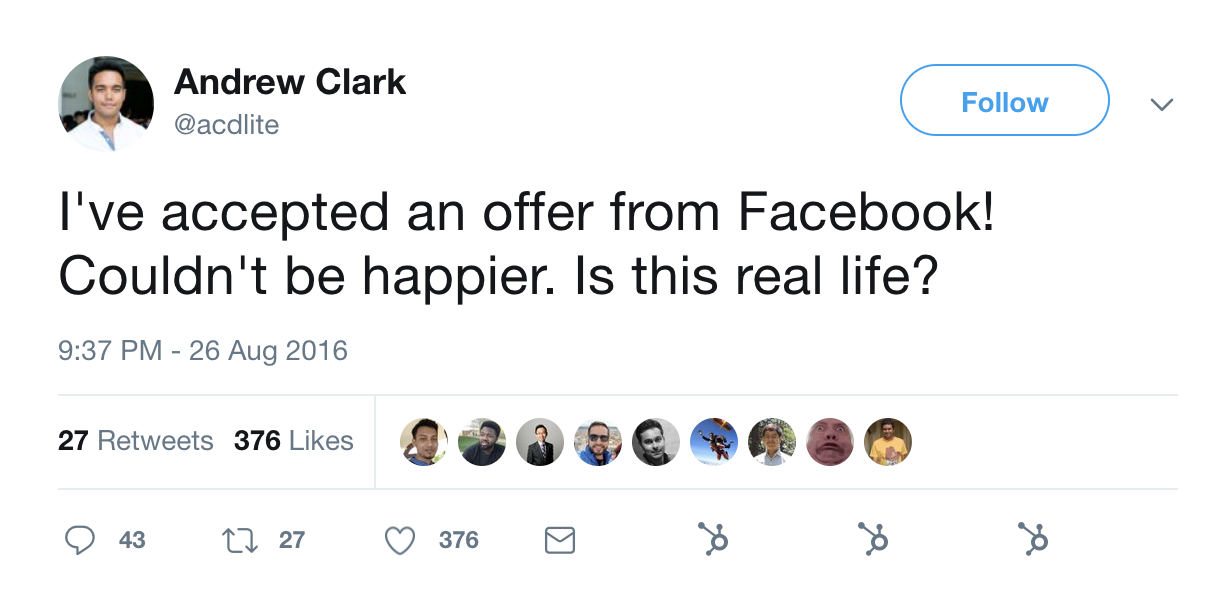Contributing to Open Source is a great way to improve your skills and discover new opportunities
Andrew Goldis
1 May 2019
•
11 min read
Being a professional software developer requires continuous improvement and learning.
It doesn't matter if you are a boot camp rookie, university graduate or a software development veteran, it would be useful for your own professional development (and curiosity) to explore different approaches of doing software.
Keeping up the pace is quite difficult. You have grow "horizontally" - be aware and get experience with new technologies, improve your expertise with mainstream popular tools; also you'd evolve "vertically" by solving more complex and more abstract problems.
Experienced developers are limited by the tech stack adopted by the team at their workplace. Being aware of different approaches would give them leverage and show a different perspective on the solutions that are common at the team/company and alternatives.
For the developers at the beginning of their career path, it is even more challenging. The variety of tools and techniques is overwhelming! It's very hard to know what to focus on and what tool is the best for a specific task without prior experience with similar kind of a problem.
Courses and tutorials, even advanced, usually, do not provide the required level of confidence. There's always a "beyond the tutorial" wall. You stumble upon a problem that is out of tutorial's scope and start looking for solutions elsewhere.
My main background is web development, and this specific niche of software development has undergone tremendous changes during the last years. There's a well-known phenomenon of "Javascript fatigue" caused by the number of new tools and techniques that emerge every week. The language itself changed a lot and became the most popular programming language on the planet.

In this post, I want to share the technique of using open source projects for professional development that I've been practicing during the last few years.
The JS eco-system is particularly "open sourced" - that allows using the power of OSS to the full extent.
It is very good for you
Contributing to open source is good for you. Actually, it is good for everyone, and here's why.
You help others
No matter what your contribution type is - documentation, code changes or even just opening an issue - you improve the tools we all use and make other developers life easier.
Excellent projects quality
Open source software is not an underdog anymore. The quality of code is often superb to internal codebases. By working on projects of such a quality you see how others do good software.

Glimpse into professional software development
You can literally see and learn how software is done at Microsoft, Google or Facebook (and many other companies that are known for good engineering) - the companies use an open source license to share internally written code.
Collaborate with experts
It takes quite a lot of experience and expertise to recognize, implement and maintain a successful software project.
People behind these tools have a passion for their creations and love what they do - they are true experts. The feedback you're getting while working with them is valuable.
You're creating a proof of your expertise
Having an impressive portfolio on Github (or whatever platform of your choice) is a solid indicator for your future employer. Moreover, many headhunters use Github to find talents.
Many companies hire core contributors that work on company-supported open source projects.
Some companies sponsor maintainers of open source project without hiring them.

It is free
Education and experience are expensive. While engaging and contributing to open source projects, you're getting valuable experience of practicing software development, getting feedback and creating a portfolio for free!
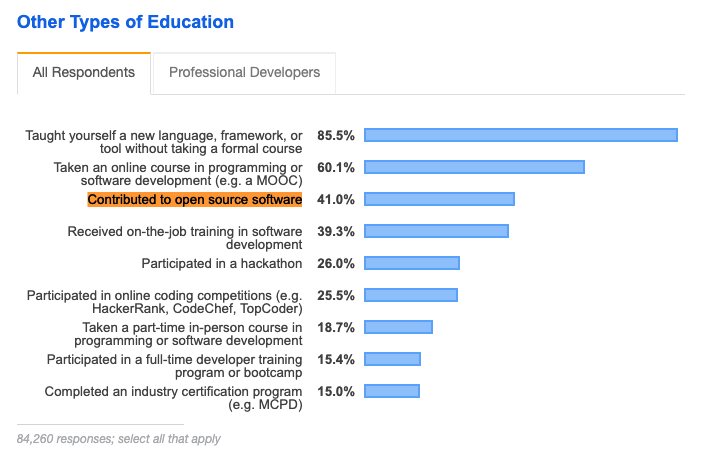
Now that we've agreed that contributing is awesome, let's try to break down the types of contribution you can do, depending on available time, required effort and expertise in the subject.
Every time you face a problem
It is hard to start contributing without any context or specific motivation - how do you pick a project that is interesting enough and would be useful for your professional development?
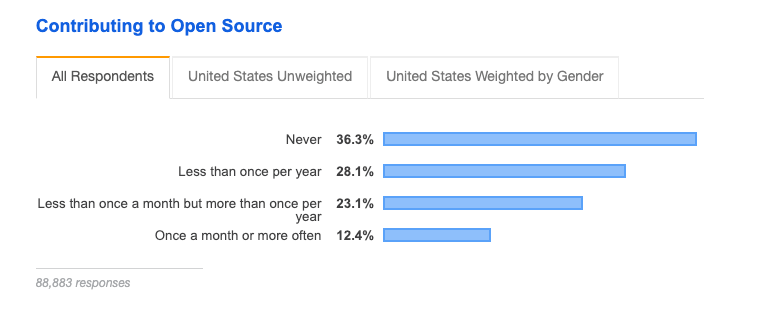
It is much easier to start when you have an actual problem with a third-party open source project. A problem that matters to you.
Fortunately, Javascript development is very dependant on publicly available software (via npm packages) and the solutions are not perfect.
Every time you see a problem - either it is a configuration, documentation or an actual issue, it is an opportunity to improve, contribute, and to learn/boost your professionalism!
The contribution checklist
Create an issue
That's the minimal, least time-consuming and most important type of contribution you can do.
One can say it is not a real contribution, but I do consider it very important. In fact, Github does count it as a contribution:
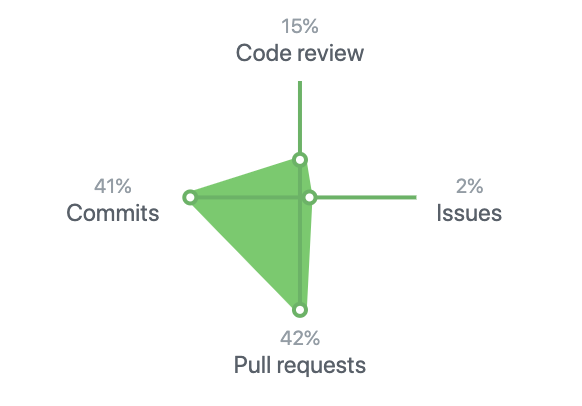
Let's start with an obvious observation - without creating an issue, maintainers would never know there's a problem with their software, neither they would be able to improve it.
But, you're the one who mostly benefits from doing that!
Have you ever found yourself trying to unsuccessfully solve a problem, and after a few attempts calling a colleague for help? As soon as you start to describe the problem - eureka!
You've suddenly got it! (Usually, it's a typo, right?)
It is quite hard to describe a problem effectively and precisely ✍🏻. Most projects today use some kind of a template for new issues. By following the template, you're forcing yourself to look at the problem from a different point of view.
By describing the problem in your own words, you can suddenly realize what the solution is and… just apply it!
Alternatively, describing the problem in your own words could spark new ideas/hypothesis. If that's the case - 🙌🏻 great job - go ahead and tell your colleagues.
If not, you've just created an issue with a good explanation. It would help the maintainers. You help other developers - now they are able to confirm that the problem is not in their own code. People will discover your issue and add 👍🏻
By having this first engagement you create an opportunity for the maintainers to guide you, possibly propose a solution and motivate you to open a pull request with a fix (more on that later).
See, you're already helping lots of people!
Bonus: When creating an issue on Github, you get a nice auto-suggested list of already existing issues, that helps to discover solutions and prevents duplications! 👍🏻
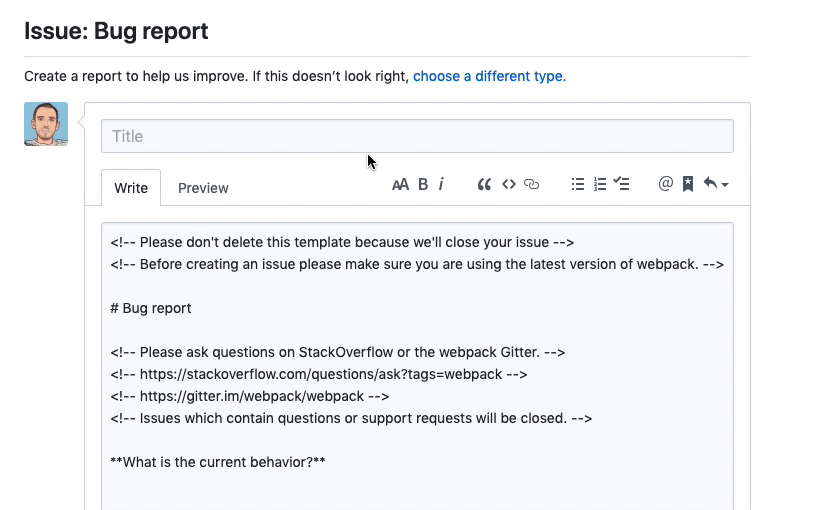
Provide a minimal example
It would be much easier for the maintainers to deal with a very specific, minimal representation of the issue you're reporting.
Although it is more time-consuming, it is also beneficial for you. By extracting the problem you get:
- confirmation that it is actually a problem with the tool/library itself and not with your own code
- a better understanding of what the problem is (which can be used later to effectively describe the issue)
- opportunity to solve the problem by dealing with a simplified context
By removing unnecessary complexity while composing a minimal example, there's a high chance that you understand the problem better, discover a solution or even realize that it wasn't a problem at all 😼
Here's a list of some platforms that can be used to create a reproducible example:
- A new repository on Github
- Codesandbox
- JSFiddle
- Codepen
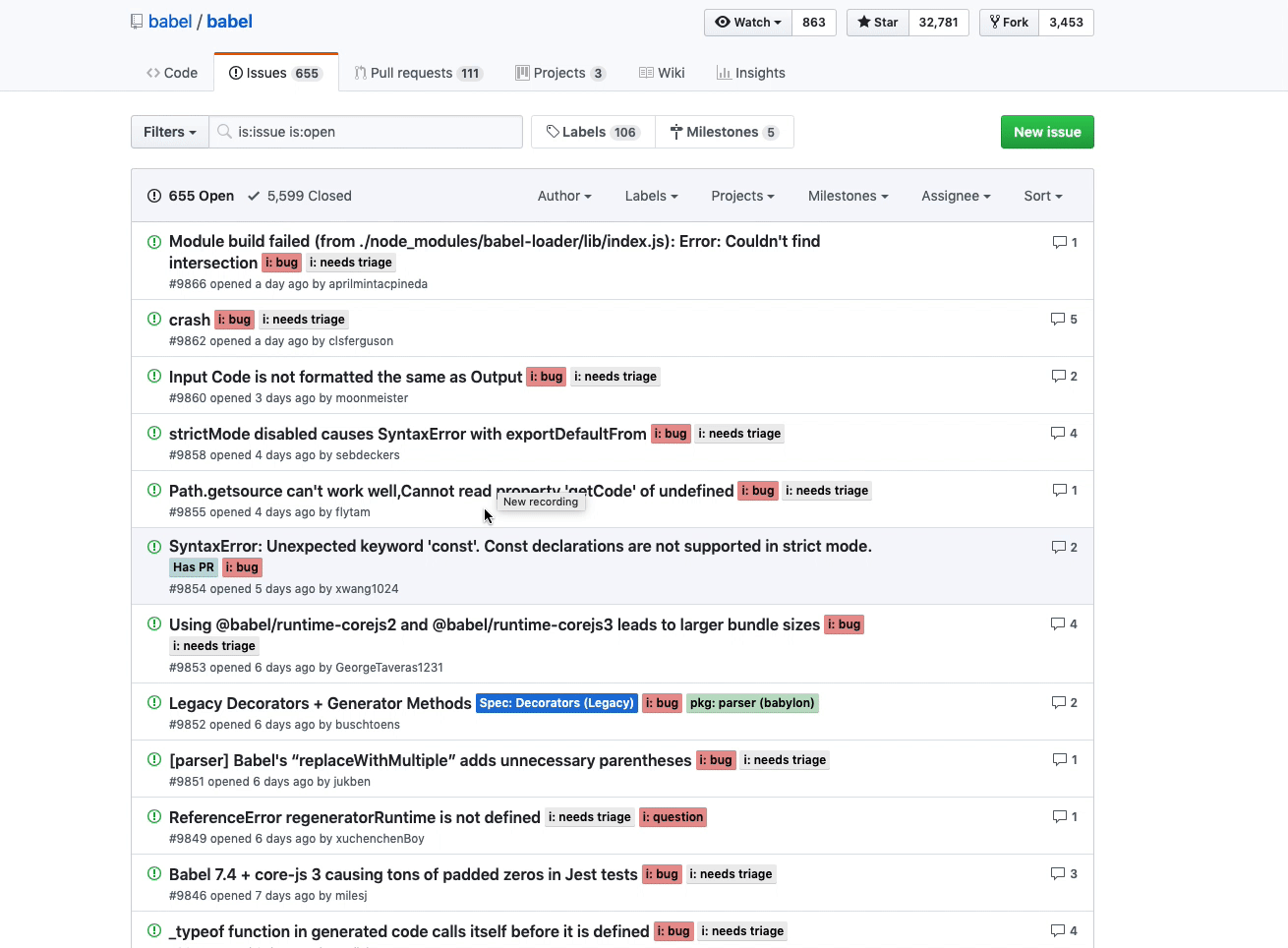
Find a workaround
At this stage the problem is confirmed and validated, or maybe not completely validated, but… you want to move forward and just get rid of it!
Most chances you don't have time to dig into the 3rd party library source code, but you can probably find a workaround!
It could be an ugly monkey-patching, configuration change or some creative way you've found to overcome the problem. It is your obligation to share it with the world!
Either create a new issue or add a comment. You'll get tons of ❤️, 👍🏻 and 🎉!

Bonus: other people could comment and share a workaround that's better than yours.
Suggest a solution in comments
Great news - you've just found a solution or have great confidence about what might be a good solution!
It works great in your codebase, but you don't have time to create a pull request with tests and /or documentation.
It still might be valuable to just share your discovery - others will pick it where you left.
BTW, often the problem is not even in the code - it might be a configuration issue or lack of clear documentation that leads projects users in a wrong direction. The point is to share this little piece of knowledge - it is valuable, even if it doesn't seem like significant contribution.
Implement a solution in your own repository
What happens a lot is that project maintainers are not quite responsive. Most chances they are just busy with their life, or too busy at a workplace.
A good temporary solution might be forking the project and pushing the change in your own repository.
Your peers can use your temporary repository as a dependency. While not ideal, it can help your team to move forward. ✅
Meanwhile, submit your fix as a PR. Eventually, the authors will review your fix and issue a new release. It is very important to create the PR though, otherwise, you're at risk of being stuck with a dependency that cannot be updated.
Sometimes, authors will suggest joining core contributors list, and that's awesome - you have the opportunity to take the responsibility and maintain a project with active users.
Create a Pull Request
Pull requests are the bread and butter of open source development.
Everyone can contribute, take part in a bigger project, leave a digital trace of skill and expertise 🌟
Most important - it is the biggest, most effective opportunity for an individual to learn and improve 💪🏻

There're several layers of valuable experience you gain by submitting a pull request - let's list them:
-
You see how complex problems are solved, discover new architectural approaches, different ways to organize project and code
-
You discover new coding styles and techniques
-
You discover new or different use of testing frameworks, CI pipelines, linters and enrich your experience and knowledge of using other complementary tools
-
You are creating an opportunity to get valuable feedback from experienced professionals
-
You are learning the internal implementation of the tool you're working on - it will help you to use it better
-
You're creating an authentic, transparent record of your achievements and professionalism
-
You connect with other developers, which creates opportunities for collaboration, hiring and, is simply fun
That's how you learn and become a better professional - you do more of different stuff.
You see and try different approaches, learn the good and the bad parts, apply what you've seen in different situations and get feedback about your decisions.
By iterating and regularly challenging yourself with more complex subjects you gain the professional confidence and experience 🥋
Discovering opportunities to contribute
As I have mentioned, it is easier to start to contribute when you have an actual issue that you have to resolve. But what should you do if you don't work with OSS tools and still want to find contribution opportunities?
Online
Github recommends project owners to assign labels to issues that are easier to start with. A simple search by label: good first issue will reveal more than 200k issues to pick from 😄
You use label: help wanted search query to discover more complex issues that are not necessarily beginners-friendly.
There're plenty of resources that do some kind of aggregation based on technology, difficulty, and popularity of a project.
Here's a list of few such projects to get you started:
- Awesome list for beginners - a curated list of projects categorized by tech stack
- http://github-help-wanted.com/ - "help wanted" issues aggregator
- https://www.firsttimersonly.com/ - a list of useful reads for newcomers to open source
- https://giistr.com/ - search, filter and help easily on the issues of the repositories you starred
- https://www.codetriage.com/ - pick your favorite repos to receive a different open issue in your inbox every day
- http://issuehub.io/ - issues aggregator by tech and difficulty labels
- http://www.pullrequestroulette.com/ - a list of pull requests (or PRs) submitted for review, belonging to open-source projects
And a lot, a lot more…
Offline
There's a good chance more people in your area are interested in open source contribution opportunities. Try to find a meetup event.
One particular example I want to highlight is Goodness Squad. I personally participated in one of those events few years ago. It was extremely effective and helpful.
Summary
While writing the article and discussing it with my friends, we noticed that there are plenty of resources that help to discover projects that need contributors help. However, it is quite hard to find a project that you can learn a particular skill / coding aspect.
That's why I have created an alpha version of such a list here
This is a small list of projects that I personally found helpful for my own professional development (Javascript-related only for now). I hope it will help developers to find good projects that they can learn from.
The Cover Photo by Hello I'm Nik on Unsplash
P.S.
Edit (April 23, 2019):
I'd like to highlight a comment by a user on the original Dev.to post.
Nick gives us few hints and provides real-world examples of his contributions to OSS. Here's a brief summary of what Nick mentioned, more details in the conversation thread:
-
I would say only work on stuff that you find interesting and challenging. Otherwise don't bother. You won't enjoy it.
-
When I first started learning react, I started contributing as a way of learning. I found a react boilerplate project,
react-slingshotand just started offering suggestions that became PRs, and also did bug fixes. Takeaway from this is open source is a great way to learn from others and if you contribute enough to a project, you may be asked to become a maintainer (if that's your jam).
Looking for more Open Source issues to contribute to? Sign up for Works Hub Issues to get paid to work on real Open Source projects for companies on our platform
WorksHub
Jobs
Locations
Articles
Ground Floor, Verse Building, 18 Brunswick Place, London, N1 6DZ
108 E 16th Street, New York, NY 10003
Subscribe to our newsletter
Join over 111,000 others and get access to exclusive content, job opportunities and more!
